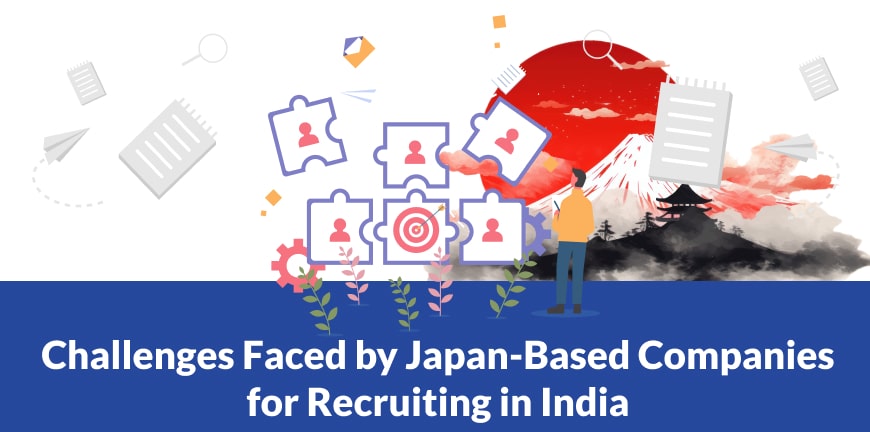
What is Leadership Hiring? Key Strategies and Best Practices
14/11/2025
PEO vs. EOR: The Difference (And Which is Right for You)
14/11/2025- Why is There a Growing Demand for Indian Talent Among Japanese Employers?
- Why are there Gaps in Language Proficiency and Cultural Readiness?
- What are the Misaligned Hiring Expectations and Workstyle Differences?
- Operational Barriers in India Talent Acquisition for Japanese Companies
- What is the Relocation, Visa, and Integration Challenges?
- How ALP Consulting Helps Japanese Companies Hire Bilingual Candidates in India?
- Frequently Asked Questions (FAQs)
Japan and India have always been friendly towards each other and offered unwavering support during tough times. Currently, Japan, once a global tech giant and the land of exuberance, is facing a severe talent shortage and has slipped to 6th position in the world’s economic superpower, whereas India is rising towards the top.
India has an outstanding pool of young talent mixed with expert professionals, and Japanese companies are going all guns blazing to hire foreign talent, especially Indians, to compensate for their talent gaps, creating a win-win situation for both countries.
However, certain challenges still need to be addressed to ensure Japanese companies can hire Indian talent without hassles. Let’s discuss the roadblocks and possible solutions for Japanese companies looking for bulk recruitment in India.
Why is There a Growing Demand for Indian Talent Among Japanese Employers?
Japan will face a nearly 3.84 million workforce shortfalls by 2035 and hence has no choice but to import talent across the globe to manage the demand. To fill talent gaps of such epic proportions, Japan believes India can solve it in one swipe.
Especially in the technology and engineering sectors, Indian professionals are the most equipped in terms of expertise, skill levels, experience, and a strong work ethic. Currently, India has 1.5 million engineering and tech graduates passing out every year with flying colours, making them an ideal fit to work in Japanese-based companies.
With a shrinking younger workforce and growing digital demands, Japanese companies are seeking skilled, culturally adaptable, and cost-effective professionals. Indian talent stands out due to its technical expertise, global mindset, and strong educational background, making it a strategic solution for compensating for Japan’s talent shortage.
Here are 5 reasons why there is a huge demand for Indian talent among Japanese firms.
1. Strong Technical and Engineering Skills
Indian professionals, especially in IT, engineering, and software development, possess high technical competence, making them ideal for Japan’s rapidly digitising industries and Industry 4.0 initiatives.
2. Language Proficiency
Indian candidates often have strong English communication skills, bridging the language gap and enabling smooth collaboration in Japan’s increasingly global and client-facing business environments. Additionally, Indians are capable of learning Japanese better than other overseas countries, making them ideal to blend in Japanese companies as bilingual experts.
3. Cost-Effective and Scalable Talent Pool
India offers a vast, cost-efficient workforce, allowing Japanese companies to scale teams and reduce hiring costs without compromising on skill quality or project output.
4. Cultural Adaptability and Global Exposure
Many Indian professionals have international work experience and demonstrate high cultural adaptability, which eases integration into Japan’s structured, process-driven, and collaborative work culture.
5. STEM-Focused Education System
The Indian education system is based on the science, technology, engineering, & mathematics (STEM) model. This, along with a large youth population, results in the creation of a vast pipeline of job-ready graduates who can work for either Japanese companies operating in India or move to Japan and start their careers abroad.
Why are there Gaps in Language Proficiency and Cultural Readiness?
The need for Indian talent in Japan is skyrocketing; there is absolutely no reason to doubt it. There is no other country than India with such a huge young talent base. However, most talents aspiring to work for Japanese companies struggle with language proficiency and cultural adaptability. These gaps create obstacles that hinder smooth integration into Japanese workplaces and limit job opportunities, especially in managerial positions.
Addressing these challenges requires substantial efforts in education, training, and collaboration between Indian institutions and Japanese companies.
1. The Japanese Language Training Infrastructure in India is extremely limited
Japanese is not a widely taught language in Indian schools or colleges like English or French. Also, certified language training centres offering JLPT assistance are limited, making it hard for students to achieve the required proficiency levels through formal coaching.
2. Low Industry-Academia Collaboration
Few structured programs exist between Japanese companies and Indian educational institutions to integrate language and cultural training into technical or management curricula, leading to poor industry preparedness.
3. Lack of Cultural Orientation Programs
Indian professionals often lack exposure to Japanese workplace norms, such as hierarchy, punctuality, and indirect communication, due to insufficient cross-cultural training and real-world training opportunities.
4. Perception of Language as an Optional Skill
Most Indian graduates believe English and technical expertise can suffice all over the world, and don’t consider learning the Japanese language. This can be a huge mistake, as most managerial roles in Japanese companies require bilingual expertise.
5. Resource and Curriculum Gaps
There is a shortage of qualified Japanese language instructors, updated learning materials, and immersive learning environments, making it difficult for learners to reach business-level Japanese language fluency and cultural confidence.
What are the Misaligned Hiring Expectations and Workstyle Differences?
Here are 5 misaligned hiring expectations and workstyle differences between Indian talents and Japanese companies seeking to hire them:
1. Expectations of Long-Term Employment
Japanese companies prefer long-term employee commitment, while many Indian professionals seek faster career growth, creating a mismatch in retention expectations and employment stability.
2. Differences in Interview and Selection Style
Japanese hiring methodology emphasises personality fit, group harmony, and loyalty, whereas Indian candidates are used to skill and performance-based evaluations, leading to differing perceptions of “ideal” hires.
3. Communication and Hierarchy Gaps
Japanese workplaces rely on indirect communication and strict hierarchy, while Indian professionals often expect open dialogue and quicker decision-making, causing friction in collaboration and leadership expectations.
4. Work-Life Balance Perception
Japanese companies may expect high dedication and long hours, conflicting with Indian professionals’ growing preference for flexible schedules, balanced work-life, and mental well-being.
5. Slow Decision-Making vs. Fast-Paced Mindset
Japanese firms often follow a consensus-driven, slow decision-making process, which may frustrate Indian talent accustomed to agile, rapid execution environments, affecting productivity and satisfaction.
Operational Barriers in India Talent Acquisition for Japanese Companies
Japanese companies expanding their business horizon in India or seeking Indian talent to work back home often encounter operational barriers during talent acquisition. These challenges hinder efficient hiring, onboarding, and integration, affecting their ability to build strong, localised workforce strategies.
1. Complex Regulatory and Compliance Environment
India’s labour laws, tax norms, and hiring regulations vary by state, creating confusion and delays for Japanese firms unfamiliar with local legal and HR compliance frameworks.
2. Limited Local HR Expertise in Japanese Firms
Many Japanese companies lack in-house HR teams experienced with Indian hiring practices, leading to ineffective recruitment strategies, poor employer branding, and inconsistent candidate engagement.
3. Inadequate Recruitment Partner Alignment
Local hiring agencies may not fully understand Japanese work culture or expectations, resulting in mismatched candidates and prolonged hiring timelines for specialised or senior roles.
4. Onboarding and Training Gaps
Lack of focus on structured onboarding, cultural training, and role clarity leads to early attrition and productivity loss among Indian hires in Japanese companies.
5. Language and Documentation Challenges
Japanese firms often require bilingual documentation, reporting, or communication, but face delays due to translation issues and a lack of bilingual Indian talent familiar with Japanese corporate terminologies.
What is the Relocation, Visa, and Integration Challenges?
Here are the 5 relocation, visa, and integration challenges faced by Indian talents seeking a career in Japan:
1. Lengthy and Complex Visa Procedures
Japan’s work visa process is complex and takes rigorous follow-up for final approval. It involves strict documentation, employer sponsorship, medical approval, and language requirements, leading to delays or rejections that disrupt hiring timelines and candidate mobility.
2. High Cost of Relocation
Relocating to Japan includes expenses for housing, travel, insurance, and settling in, which can be financially burdensome without comprehensive employer support or relocation packages.
3. Language Barriers in Daily Life
Outside the workplace, limited Japanese language skills make regular chores like renting apartments, grocery shopping, or accessing healthcare extremely challenging, affecting the comfort and confidence of relocated Indian professionals.
4. Difficulty Integrating into Japanese Work Culture
Cultural differences in hierarchy, communication, and work expectations can lead to misunderstandings, isolation, and slow adjustment for Indian professionals, impacting job satisfaction and team dynamics.
5. Family Integration and Support Issues
Spouses and children of relocated professionals often struggle with access to education, language barriers, and a lack of social support, making long-term relocation decisions difficult for Indian families.
How ALP Consulting Helps Japanese Companies Hire Bilingual Candidates in India?
Japanese companies are currently expanding their operations in India and back home to reach their business goals in terms of revenue and brand value. To manage business operations without disruptions, Japanese companies are planning to hire Indian talent in bulk, but are facing numerous challenges and obstacles, as discussed previously.
Is there any way to reduce these gaps and create a bilingual talent pool on a large scale? Yes. ALP Consulting, a leading bilingual recruitment agency, has the solution to serve as a bridge to connect Indian talent with Japanese-based companies.
ALP is offering an end-to-end career development program for Indian professionals looking for lucrative careers in Japanese companies. Our program is comprehensive and includes the following steps:
1. Internship Opportunity
After completing the JLPT N4 level and graduation, ALP will offer a 4–6-month internship/apprenticeship in India. This hands-on experience provides valuable industry exposure and prepares candidates for global roles.
2. N3 Level Learning Support
ALP will provide structured training to help students clear the JLPT N3 exam, ensuring their language proficiency meets the standards required for professional roles in Japanese organisations.
3. Job Interview Coordination in Japan
Upon successful completion of the internship and N3 certification, ALP will coordinate and schedule interviews with leading Japanese companies, helping candidates secure job opportunities aligned with their skills.
4. Advanced Language & Cultural Readiness Training
After selection, candidates will undergo intensive N2-level language training along with cultural orientation and client-specific preparation. This phase takes place during the 2–3-month visa processing period.
5. Visa and Onboarding Support
ALP will offer end-to-end support in obtaining work visas and provide comprehensive onboarding assistance to ensure a smooth relocation and seamless integration into the workplace and life in Japan.
Frequently Asked Questions (FAQs)
1. Why are Japanese companies hiring Indian professionals in large numbers?
Japan faces a workforce shortage, and India offers skilled, cost-effective, and culturally adaptable talent, especially in engineering and technology.
2. What makes Indian candidates suitable for Japanese companies?
Strong technical skills, STEM education, English fluency, and adaptability make Indians ideal for Japan’s digital and engineering workforce needs.
3. Why do Indian professionals struggle with Japanese job opportunities?
Language barriers, cultural unfamiliarity, and lack of structured training limit access to professional roles and workplace integration in Japan.
4. How does ALP Consulting help Indian candidates become job-ready for Japan?
ALP offers JLPT training, internships, interview support, N2 readiness, visa assistance, and onboarding to ensure career success in Japan.
5. What support does ALP provide after job selection in Japan?
Post-selection, ALP trains in N2-level Japanese, cultural skills, and helps with visa processing, relocation, and workplace integration.
Contact Us For Business Enquiry

Kishore V N
Kishore V N is the Managing Director at ALP Consulting, bringing over 29 years of extensive experience in global recruitment, talent strategy, and workforce solutions. He has been instrumental in building scalable RPO, MSP, and modular talent sourcing models that empower organizations with a competitive edge in talent acquisition. Kishore’s leadership focuses on expanding ALP’s global presence, driving innovation in recruitment technology, and enhancing operational excellence. He also serves as Director at Datacore Technologies, steering digital HR transformation through advanced HRMS and virtual staffing solutions.




